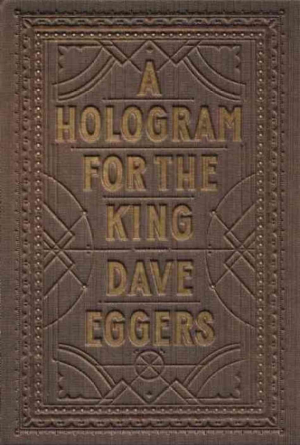By Dessa Bayrock (The Cascade) – Email
Print Edition: January 16, 2013
 Sometimes the old adage “don’t judge a book by its cover” is completely out of line. The cover of David Eggers’ novel A Hologram for the King is a deep, gorgeous burnished gold with the title spelled out in stately capitals. It catches the eye and doesn’t let go, which is the only reason I picked it up.
Sometimes the old adage “don’t judge a book by its cover” is completely out of line. The cover of David Eggers’ novel A Hologram for the King is a deep, gorgeous burnished gold with the title spelled out in stately capitals. It catches the eye and doesn’t let go, which is the only reason I picked it up.
I read the first two chapters standing at the sale table in the bookstore without even realizing it, and when something entertains you that long without your knowledge you kind of sit up and pay attention. So I bought the book – partly because it was pretty, partly because it snagged me right away, and partly so the clerk would stop glaring at me.
All in all, it’s a quick and light read, constructed with refreshingly simple prose. We flit along the path of the protagonist’s thoughts effortlessly, like butterflies. It’s easy to get in and out of, making it perfect to pick up and put down in between homework.
The novel itself rests between two worlds, straddling tradition and technology. It opens with Alan Clay, our stalwart and everyday hero, sitting on a flight to King Abdullah Economic City somewhere in Saudi Arabia. This immediately places the novel: Alan is a middle-aged, very nearly washed-up business man, flying halfway around the world to meet King Abdullah and sell him a hologram.
Before Alan reaches his destination, we become extremely familiar with his perpetually underlying anxieties – about his daughter, his ex-wife, whether his father is proud of him, and if he’ll be able to make the deal of his life.
Alan’s anxiety is almost perfectly embodied in a lump he has discovered in his neck. Too terrified to talk to a doctor, he secretly prods it, both despising and treasuring it. A tumor? An infection? Some anomalous mass? No matter what it is, Alan imagines it attached to his spine, sucking away his life in imperceptible increments.
Alan instead focuses on the problem of the hologram – the technology is solid, but the transaction will be ruled by a series of power plays. The company the king ultimately chooses to supply holograms to his economic city will be determined by who has the best connections.
But Alan feels as though he has the advantage on two counts – first, that he went to school with King Abdullah’s nephew, and second that he needs this deal more than anyone else can possibly need it. Without the bonus he’ll receive with the sealed contract, he’ll lose his house and have to withdraw his daughter from college. This is more than a business transaction – it’s the final battle in Alan’s war for his self-worth.
Alan fills the role of foreign business specialist almost sheepishly, trying to balance being polite with demanding his needs be met. The deal, he thinks, will be easy. However, things are not so simple when he finally arrives. The first blow comes when he and his (much younger and boredly competent) team makes are relegated to a giant tent instead of allowed space in the presentation centre itself. In a second, more forceful hit, it quickly becomes apparent that not only is the king not in the kingdom, but also that no one knows when he’ll be back.
Fighting overwhelming desperation, Alan spends several nights wickedly drunk on moonshine – something procures almost by accident, since the kingdom is largely Muslim and alcohol is strictly prohibited.
This drunken hotel room becomes Alan’s own kingdom – with fire in his belly, he becomes brave, imperial and sure. Alan becomes brave enough to face his past (by calling his father and writing a letter to his daughter), to face his future (by resolving to to demand better attention from the king’s entourage) and also himself. Steak knife in hand, he courageously and barbarically attacks the alien lump in his own neck, satisfied with the healthy flow of blood and the lack of pain. He gleefully—and somewhat regretfully—decides the lump can’t possibly be attached to anything vital, and with that he falls into bed and into sleep.
This is a theme that prevails subtly throughout the novel: internal versus external, fighting the weakness within one’s own self, and both fearing and battling the foreign.
I won’t spoil the ending, other than to say the novel doesn’t quite end. The quest to deliver a hologram to the king remains incomplete, continuing off into the horizon. We’re given a window into Alan’s experience, rather than a complete story, and this works in the novel’s favour. Life, after all, doesn’t often end with closure. Instead, we see a perfect view of Alan – his thoughts, fears, defeats, and subsequent rallies.
Our protagonist is quintessentially human, and it’s an utter relief to be let into someone else’s head, to understand and accept another set of anxieties so completely that the reader forgets their own.

